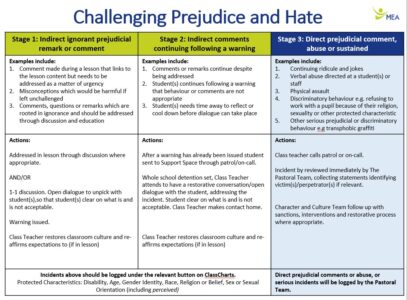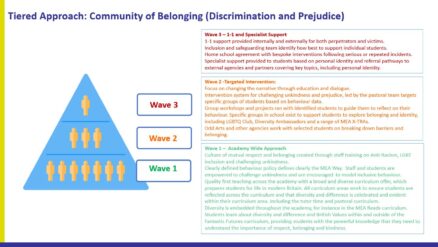What do we do when one student is unkind to another? Research shows that a sense of belonging is fundamental to not only achievement, but attendance and life-satisfaction, but how do we create it? (How might being a Beacon School help?)
There has long been a discourse in education, that the fewer behaviour incidents a school logs, the better the school is at dealing with behaviour. This is partially true, as there must be a culture that underpins and promotes positive behaviour, which in turn sees fewer incidents logged. There can be a nervousness around high numbers of incidents, as leaders may see this as a poor reflection of the culture of a school. It is also not enough to only teach about diversity in all its forms, but also essential to have a robust and all-encompassing set of expectations and behaviours which sets out the culture we want as a school.

Our experience shows that having accurate data that reflects a truer picture of what is happening in our school is a powerful tool to inform next steps and interventions. As part of our work in creating a Community of Belonging, challenging prejudice and hate has empowered staff and students to challenge all forms of unkindness. With staff logging all incidents, we have a clearer picture of what is happening across our academy, allowing us to respond to prejudice and hate more effectively. Logging these comments that may been historically dismissed, or addressed briefly in lessons, gives us a clearer picture of the student experience, and as such, we can do more to improve.
‘No Place for Bullying’, published by Ofsted in 2012, is still highly relevant today, as continually demonstrated by research into LGBT phobic bullying across the UK by Just Like Us and Stonewall.
Harmful societal behaviours strike at the heart of personal identity. These must be tackled head on. This can be achieved with a culture and systems which enables all stakeholders to do this.
Unkindness, prejudice, and discrimination can only be addressed through open dialogue and education. Our system has this at its heart. We fundamentally believe that ‘one-off’ comments and remarks, which may be made subtly between and to students should not be dismissed. We must recognise that prejudicial remarks strike at the heart of a student’s identity – they are the antithesis of a community of belonging. Historically these may have been seen as ‘banter’ or ‘ignorance’ by schools. It may even be easier to just teach about diversity, than address the issue whole school. Radically challenging problems requires a radically different approach, both bottom-up and top-down. Whilst an individual incident could be labelled as ignorance, or a slip of the tongue in action does a disservice to the culture, behaviour and attitudes required to make meaningful change and end generational cycles of prejudice and discrimination. A true community of belonging aims to ensure that all actions are addressed, all the time.
More recently, Ofsted’s report on sexual harassment, published this summer was a further signal that sexism and homophobia are more commonplace than we as educational practitioners would like to admit, or be accountable for. Grand gestures and one-off lessons are not enough, as this report made clear, to ensure that our schools are safe for everyone to truly feel like they belong and create an environment which is conducive to all to be their authentic selves.
Our hypothesis going into this behavioural reset, as part of our work on belonging was:
- How does our behaviour policy and practice link together to challenge all students to be their best?
- What happened if these moments were being replicated by the same students in multiple lessons?
- What could we do to combat this pattern?
- Do we use these transgressions as an opportunity to challenge harmful and deeply engrained misconceptions?
- Are students given opportunities to reflect and move on from their mistakes?
- Do we set the tone that all comments are addressed through open dialogue, rather than punitive sanctions?
Our goal is to create a community of belonging where students feel safe to discuss the issues that are so prominent outside the classroom, it is then, important that we have the highest expectations and challenge all comments, as you promote what you permit.
Our work over several years has focused on specific areas, such as work towards achieving UCL’s Beacon School Quality Mark Status last year, or receiving the Rainbow Flag Award, or being a Rights Respecting school with UNICEF. At the root of belonging is kindness – challenging unkindness and empowering students and staff to promote kindness moves our whole academy forward, helping us to sustain the years of work we have undertaken on LGBT inclusion and challenging extremism. The emphasis on kindness cannot be understated – kindness epitomises the behaviour and values we want our students to demonstrate and it is kindness which is the best way through which we can break down barriers, cultural divides and prejudice. We acknowledge that antisemitic, homophobic and racist incidents are on the rise, and this is one of the strategies we are using to ensure that our community battles back against this prejudice. We realise that subject knowledge is vital to a successful implementation and have encouraged and seen multiple staff successfully engage with the rich UCL CPD offer.

At the heart of our approach then, has been developing a system that can combat the ‘little’ indiscretions. This involves training staff to challenge these without disrupting learning or vilifying students, as we believe that it is through education that we can change the narrative and end generational cycles of discrimination. Working with the UCL Centre for Holocaust Education has been profound in developing our intervention systems which are waved to ensure we make a culture shift across the academy. Our new three stage behaviour strategy below ensures we can respond robustly and appropriately, the system also includes a series of interventions and a home school agreement, as fundamentally, it is the power of open dialogue and education that we can truly challenge discrimination, prejudice, and hate.
So far, we have found staff to be more confident in a system that empowers them to have difficult conversations with students and supports them throughout this trial and learn phase. Regarding the number of incidents, it is true that we have seen an increase in behaviour data points. However, since the initial introduction of this school wide approach, these numbers have steadily declined. Furthermore, our safeguarding work has been enhanced as we have a far better understanding of the dynamics of our students. We demand high learning expectations of our students, and one of these must be to be kind to each other, which will stand them in better stead for the world of work. The school is for the students, rather than the students for the school, and as such we must provide a tailored intervention approach for each cohort. Students have already commented on the improved atmosphere at school. This system is not an add on, but a fundamental part of our approach to deliver a “Fantastic future for all”. This is one element of our work that has seen a reassessment of our curriculum and other procedures.
As part of our UCL Beacon School Quality Mark Status, students commented:
“The lessons and school have improved because of this” Ellis, 15.
“I think people can really be themselves now because it stops bullying” Samreet, 14
“Staff really care about our wellbeing and making school safe” Jack, 16
Now in our second year of creating a “Community of Belonging”, we have already seen the positive effects on our students and staff. Everyone in our academy feels more empowered to tackle unkindness in classrooms. If we did not have this whole school approach and crucially, the data behind all incidents, our students, and our community would not benefit from the transformative power of education.
Authored by Sam Ineson and Stephen King (Manchester Enterprise Academy)

